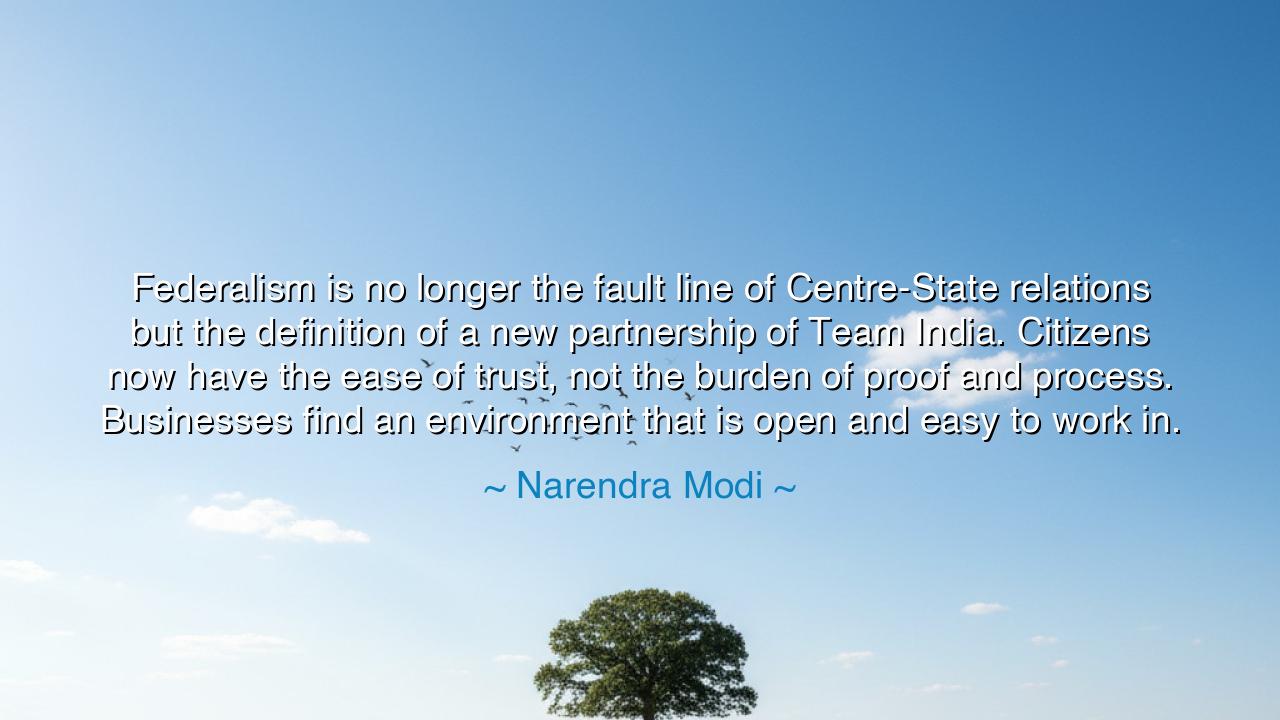
Federalism is no longer the fault line of Centre-State relations
Federalism is no longer the fault line of Centre-State relations but the definition of a new partnership of Team India. Citizens now have the ease of trust, not the burden of proof and process. Businesses find an environment that is open and easy to work in.






Hear, O listener, the bold and stirring words of Narendra Modi: “Federalism is no longer the fault line of Centre-State relations but the definition of a new partnership of Team India. Citizens now have the ease of trust, not the burden of proof and process. Businesses find an environment that is open and easy to work in.” In these words is proclaimed not only a political idea, but a vision of unity, cooperation, and trust. They speak of the transformation of federalism—from a battlefield of division to a bridge of partnership, from suspicion and red tape to faith and opportunity.
The origin of this wisdom lies in the long history of India’s democracy. For decades, the relationship between the Centre and the States was often strained, marked by disputes over power, resources, and authority. Too often, this fault line weakened the common purpose of the nation. Modi’s words sought to reimagine federalism not as division, but as partnership—an alliance of many voices working as Team India, where the strength of the whole is found in the cooperation of its parts. It is the ancient truth that unity does not erase diversity, but harnesses it for the common good.
The ancients themselves proclaimed this lesson. The Rigveda, one of India’s oldest texts, declared: “Let us walk together, let us speak together, let our minds be in harmony.” The Greeks, too, in their leagues and federations, knew that small states could endure only when joined in trust rather than rivalry. Even Rome, in its early days, bound together many tribes under one Republic, believing that cooperation was the key to strength. Across the ages, harmony between different powers has always been the seed of enduring greatness.
History offers vivid examples. Consider the story of the United States after its independence. The Articles of Confederation left the states divided, unable to act as one. But with the Constitution, the union was strengthened—not to erase the states, but to bind them in federal partnership. That balance, imperfect yet evolving, allowed the nation to grow into one of the strongest powers in the world. Modi’s vision for India echoes this same principle: true federalism is not rivalry but shared purpose, not suspicion but trust.
So too does his declaration touch the daily lives of citizens and businesses. For when trust replaces the “burden of proof and process,” governance becomes lighter, freer, more humane. A citizen no longer feels crushed beneath endless paperwork and suspicion but uplifted by confidence. A business no longer feels trapped in red tape but empowered to create and innovate. In this way, transparency and trust become the foundations of progress, and the nation grows not through force, but through freedom.
Yet beware, O listener, for trust once lost is hard to restore. If promises of partnership turn again to control, or if openness is clouded by secrecy, then suspicion will rise once more. Federalism as partnership requires constant renewal—dialogue, fairness, and respect between Centre and States, between government and citizen, between nation and enterprise. For trust is not built once and for all, but cultivated daily like a sacred garden.
The lesson is clear: greatness comes not from division, but from partnership. Whether in nations, communities, or families, progress is born when each part respects the other, and when trust replaces suspicion. Let every leader seek cooperation, not rivalry. Let every citizen act with integrity, so that trust may grow. Let every business pursue innovation in freedom, and repay the gift of trust with responsibility. Thus will harmony endure, and prosperity flow to all.
So remember the words of Narendra Modi: federalism as partnership, citizens with ease of trust, businesses with open opportunity. This is the vision of unity without uniformity, strength without oppression, peace without stagnation. If lived with courage and sincerity, it will become not merely the slogan of a time, but the eternal pattern of how diverse voices can sing as one chorus—the chorus of a nation rising together as Team India.






AAdministratorAdministrator
Welcome, honored guests. Please leave a comment, we will respond soon